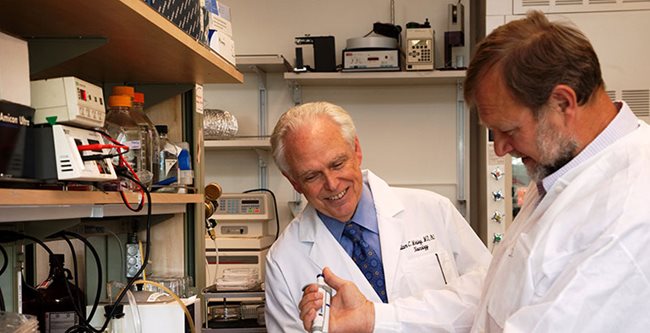
Dr. William Mobley confers with Dr. Pavel Belichenko, a close friend and UC San Diego colleague who passed away last year.
ASKED & ANSWERED: UCSD-TV HOST PROFILE
Dr. William Mobley has studied Alzheimer’s for longer than the disease has been popularly known by that name.
Dating back to his PhD studies in 1970 at Stanford University, it’s been his life’s work, as well as his later personal anguish.
His own mother died at age 97 after suffering for many years from the incurable disease formerly known as senile dementia. He recalls her debilitating decline as “a very tough time for me and my family.”
Since coming to UC San Diego in 2009 as a distinguished professor and chair of the Department of Neurosciences, Mobley has led acclaimed research into the neurobiology of both Alzheimer’s and Down’s syndrome. His studies have revealed them to be closely related.
For the past two years, he also has hosted “On Our Mind,” an interview podcast on UCSD-TV. Most recently, he devoted a series of conversations with experts about the many aspects of Alzheimer’s.
“It’s always been inspiring for me to learn what other people are thinking about,” said Mobley, “and to explore how they’re using their brains.”
A self-described “small-town boy from Nebraska,” Mobley has a scholarly, gently inquisitive manner. As he says: “Ultimately, my role here at UC San Diego is about empathy and listening. It’s the most important thing I do every day.”
Q: What fascinates you most about studying Alzheimer’s?
There are so many bits and pieces to it. What’s fascinating is to use science to pull apart the threads of this cloth – the genes and proteins that work over a period of 30 years, that ultimately kill a patient. It’s both fascinating and horrifying at the same time.
Q: Tell me more about these threads …
Like every piece of cloth, once you start pulling a few threads out, the whole cloth begin to fall apart, in a way that allows you to see through it. Right now, it’s the complexity of the weave combined with the need for more intensely rigorous science that intrigues me the most.
Q: What myths about Alzheimer’s would you like to dispel?
One myth is that it can’t happen to me –that I can ignore it because it is not in my family. Guess what? It’s likely to affect as many as half of the readers of this article. Because if people live long enough, say, 85 years, they are at a very great risk for Alzheimer’s disease.
A second contravening myth is therefore it’s essentially inevitable for everyone. I think we’re finding out that good science will prove that it is not inevitable and again, that many of those who read this article will escape it. But excellent science and translation of discoveries to therapies is key.
Q: Should those who are “of a certain age” be frightened of the prospect of Alzheimer’s?
I wouldn’t be frightened. Instead, I’d be focused on doing everything I can right now to take good care of my health. We all need to be aware of what’s called “brain health” – which fundamentally means staying physically active, exercising, eating well, staying socially active, helping others … those sorts of things.
Q: What does the future hold for our society as it grows older?
We need to focus squarely on the size of the epidemic that’s headed our way. By 2050, we predict that more than 115 million people in the world will have Alzheimer’s. Right now, we need to recognize the scope of the problem. We also need to have greater hope that, through scientific research, this will work out. And we must have the resolve to insist that the funds needed for research are provided.
Q: What have you learned about the brain from hosting these shows?
We live our lives through our brains. We know what we know because of our brains. There’s really no topic that we need not explore on the show. From a brain perspective, there’s nothing about science or art or history or social justice or the weather that is off target.
Q: How do you reconcile yourself with the concept that you might get it?
It’s not so much personal as professional, but there’s more than a little personal angst about what will happen to me and my wife and my kids – and my friends. I know the damage it does and the pain it causes.
Q: As a leading Alzheimer’s expert, how close would you say we are to finding a cure?
I’m optimistic. Going back to the analogy of the cloth, we’ve begun to see the holes. I can’t say when the cure will happen, but it will – and I’m committed to that outcome.